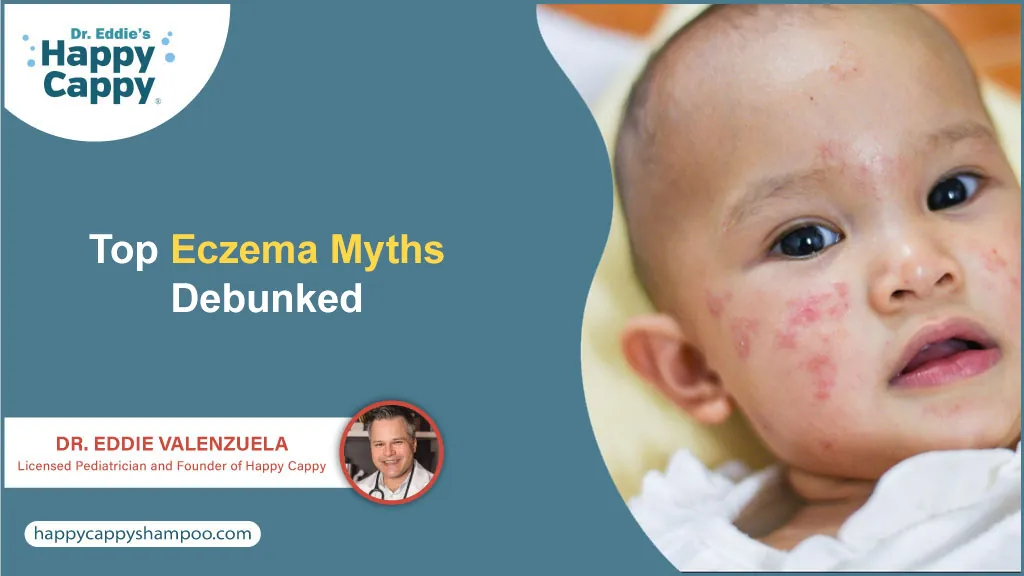
Eczema is quite common, with the National Eczema Association reporting that more than 30 million people have the condition.
But despite it being so widespread, there are still hundreds of misconceptions surrounding eczema. Let’s clear up some of the top eczema myths.
What is Eczema?
Eczema is a chronic skin condition that can cause an itchy, red, and inflamed rash on different parts of the body, depending on one’s age. Common areas include the face, hands, ankles, scalp, and insides and outsides of the knees and elbows.
Some other symptoms that you may notice in your body are:
- Dry skin
- Blisters and bumps
- Rough patches of skin
- Skin oozing and weeping (in severe cases)
Red rashes caused by eczema may appear red or pink in people with lighter skin tones. But in people with darker skin tones, they may appear purple, brown, or gray.
The exact cause of eczema is still unknown to researchers. However, they believe it is caused by a combination of factors, most commonly due to genetics, weakened immune system, impaired skin barrier, and environmental triggers.
Myths About Eczema (Atopic Dermatitis)

1. Eczema is Just Dry Skin
Almost everyone can get dry skin, but everyone does not have eczema. Eczema is not just dry skin. Rather, it results from a combination of factors that results in skin barrier dysfunction.
The proteins that make up the skin do not function exactly as they should, resulting in microscopic openings on the skin’s surface that make it harder for the skin to hold onto moisture and repel irritants.
Because the skin can’t fight off irritants, the immune system switches into overdrive and sets off an inflammatory response that causes eczema’s signature red, itchy, and inflamed rashes.
2. Eczema is Contagious
Although eczema is itchy and causes irritated skin and rashes that look similar to those caused by allergies and viral infections, it is definitely not contagious.
Due to the appearance of its symptoms, many people think that it is contagious and can be transferred from one person to another. They may avoid going near people experiencing eczema. But the truth is, it is not an infection or virus that can be spread; eczema is actually caused by things happening inside your body.
3. There’s Only One Kind of Eczema
Eczema isn’t just one condition; it actually serves as an umbrella term for several skin conditions. The most common type of eczema is atopic dermatitis, which results in scaly and dry rashes.
However, there’s also contact dermatitis, that’s caused by allergic reactions, stasis dermatitis, caused by circulatory problems, and seborrheic dermatitis which also goes by the name of cradle cap in babies, because it usually manifests on the scalp. Some other less common types of eczema are Dyshidrotic Eczema, Nummular Eczema, and Neurodermatitis.
4. Eczema Only Affects Children
The truth is eczema can affect anyone, regardless of age. In most cases it does first develop in childhood, but that does not mean you can not get it as an adult. When you first experience it in adulthood, it is classified as adult-onset eczema.
For some people, the eczema may resolve and disappear as they age. But there are still millions of adults who suffer from eczema because their eczema becomes a life-long issue and may appear again and again in the form of eczema flare-ups.
5. Eczema is Always Worse in the Winter
Unfortunately, eczema is a year-round issue. For some people, winter is the toughest time of year for their eczema, as the cold, dry air takes away even more of the skin’s moisture, worsening their condition.
But, for other people, the heat and humidity of the summer can trigger eczema flare-ups. More sweating leads to more showers, and the exposure to skin-drying agents in skincare products like soaps and shampoo increases, which can trigger a summer time flare-up. At the same time, some people may think it’s not important to moisturize their skin during a season with high humidity–this can also lead to a flare-up.
6. It is Limited to Certain Spots on the Body
While eczema rashes can pop up in the same areas of the body, the condition affects the entire skin’s surface. The skin barrier isn’t working as well as it should, even in areas where there aren’t active rashes, making it imperative to moisturize the entire body, not just the spots with rashes.
7. It will Get Better on its Own
Some people think that as eczema is a chronic condition, it will get better on its own, but the reality is that it will get worse if you don’t provide timely treatment. The inflammation and scratching can damage the skin making it more prone to developing skin infections.
Whether you are experiencing an eczema flare-up or not, following a proper eczema skincare routine is essential. A proper routine should include the use of an eczema body wash to keep the skin clean and a moisturizing cream for eczema to keep it moisturized.
8. It is Just a Skin Condition
The fact is eczema is not just a skin condition, it can highly impact your quality of life. The itching can become intense at night, making it hard for you to sleep, ultimately affecting your mood during the day.
This condition can also cause psychological issues like depression and anxiety and affect one’s self-esteem due to embarrassing rashes and continuous itching. According to the National Eczema Association, more than 30% of people experiencing atopic dermatitis are diagnosed with depression.
9. Treatment can Cure Eczema
Eczema treatment can help you soothe the symptoms, such as itching, irritation, and redness during a flare-up, but it can not help you cure it. Actually, there is no permanent cure available for eczema.
It is a chronic condition and can be easily triggered by anything and can flare up anytime. However, this does not mean that you should leave it alone and do nothing about it. Taking proper care of your skin and avoiding possible triggers can help you prevent future flare-ups and soothe the existing ones.
10. Eczema is Always Passed Down to Children
We know that eczema is caused by genetics, and it can be passed down to children from parents. But this is not true that it will be passed down to every child and every time. According to the National Eczema Society, if both parents have eczema, there is a 1 in 2 chance that their child will have it.
11. The Triggers are the Same for Everyone
Eczema triggers are different for everyone. For some people, a flare-up may be triggered by dry air, while for others, it may be caused by dust mites. Everybody is different, and their body will react differently towards the common eczema triggers.
If you are not sure what might be triggering your eczema, then consult a dermatologist who can help you figure it out with the help of a patch test.
12. Stress Causes Eczema
The fact is that eczema can be triggered when one is under continuous stress. However, stress alone cannot cause eczema. The relationship between stress and eczema is still not clear to researchers.
It is true that stress can trigger flare-ups in some people. Some believe that when your body is under stress, it releases certain hormones that can trigger inflammation or cause a mental response that urges you to scratch your body, and as a result, a flare-up is what you get.
13. It is Caused by Poor Hygiene
Just like stress, poor hygiene does not cause eczema. However, it can trigger a flare-up. Excess sweat and dirt trapped in your skin pores can worsen the condition and even lead to complications like skin infection.
This is why you must keep your skin clean with an eczema cleanser at least once daily to remove the dirt and bacteria from the skin. However, make sure that the cleanser you are using is free from any skin-irritating chemicals.
14. You will have Asthma and Hayfever if you have Eczema
People who have asthma and hay fever are more prone to developing eczema. Hay fever is also known as allergic rhinitis. If you frequently take cetirizine (Zyrtec) or loratidine (Claritin) you likely have hay fever. People who have a family history of these conditions and are experiencing eczema are more prone to developing hay fever and asthma.
However, having eczema does not mean you will necessarily develop hay fever and asthma.
15. You Can’t Go For Swimming
Some people think that going swimming or spending some time in water will make their eczema worse. This is just a myth. If you do things the right way, they will not make your condition worse.
If you are going for swimming, just keep these things in mind
- Cover your body with a sunscreen
- Don’t spend too much time in the pool. Just take a quick swim for 10-15 minutes.
- Avoid hot water in the pool.
- Cleanse your body after swimming with an eczema shampoo and body wash.
- Moisturize your skin using an eczema cream within three minutes after bathing.
Eczema Treatment

Even though there is no permanent cure for eczema, you can soothe itching, irritation, redness, found with eczema prone skin by avoiding the triggers and keeping your skin moisturized.
Keep your skin clean with the help of a fragrance-free body wash for eczema at least once daily. Take a bath with it daily; however, make sure the water you are using is not too hot, and keep your baths short by 10 minutes maximum.
Pat dry your skin after the bath and use a hypoallergenic eczema moisturizing cream to moisturize your skin–use it at least twice daily if you have very dry skin to soothe your eczema symptoms.
Make sure the products you use on your skin are fragrance-free, sulfate-free, paraben-free, and phthalate-free and are infused with natural ingredients. You may also want to avoid products with lanolin, and if you don’t like to feel slippery, avoid products with dimethicone–a silicone derivative. Shop Happy Cappy Eczema Products if you want a hypoallergenic, safe for irritated skin option.
People with eczema should always consult a physician as they can prescribe the use of topical medications, creams and ointments to make your condition better.
FAQs
What is a red flag for eczema?
If your skin is oozing, has cracks, or is bleeding, and your condition worsens even after proper care and attention, it is a red flag. It is best to consult a doctor because there is a chance that your eczema will be infected.
What is the root cause of eczema?
There is no exact cause for eczema. It is caused by a combination of factors such as genetics, skin barrier dysfunction, weak immune system, and environmental factors.
What does eczema mean psychologically?
Eczema is not just a skin issue. It can also affect the quality of your life and have psychological impacts. The continuous itching and irritation and those embarrassing eczema rashes can cause depression, anxiety, and stress in some people.
What types of people are prone to eczema?
People who have a family history of eczema, hay fever, and asthma are more prone to developing it.
Can eczema be cured completely?
No, there is no permanent cure for eczema. It can flare up from time to time. However, you can manage and soothe its symptoms by following a skincare routine and avoiding the triggers.
If your condition does not get better with this, then consult a doctor.
